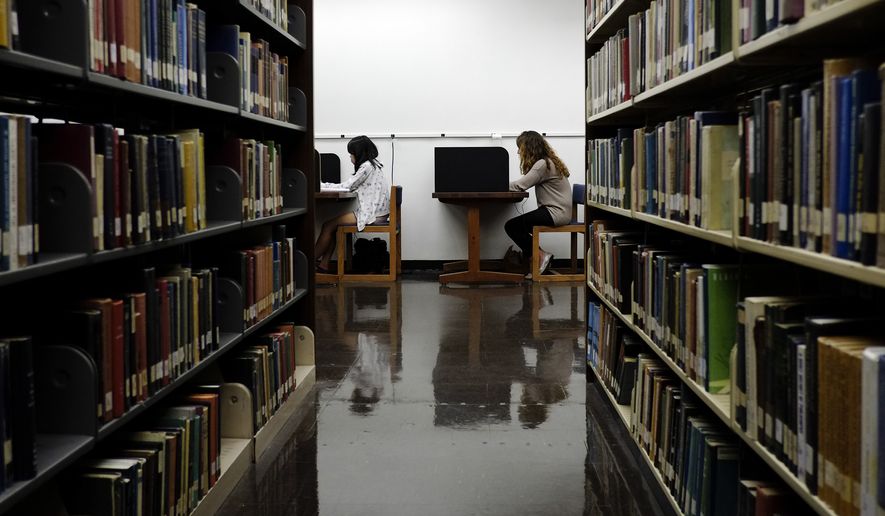OPINION:
C.S. Lewis told us in “God in the Dock”: “Put first things first and second things are thrown in. Put second things first and you lose both first and second things.” In his publication titled First Things, Richard John Neuhaus warned, “One must never underestimate the profound bigotry and anti-intellectualism [of second things].”
If I have learned anything from being a university president for the past decade and a half it is this: Education should be about promoting unity, not division. It’s called a “uni-versity” and not a “di-versity” for a reason. Classical education — truly liberating education — should champion the common cause of personal righteousness, not the self-righteousness of our personal rights.
The goal of the academy should be selflessness not self, the unum rather than the pluribus, it should teach veritas and virtue rather than victimization and vengeance. Good education should be about pursuing the goodness of unity, not the divisiveness of what you can get.
When we reverse the order, and focus on second things we get neither the first nor second. It is only by dying to self that any human being will ever find his true identity.
Who we “are” isn’t found in race or gender or desire. It isn’t found in personal grievances or in narcissistic infatuation. As St. Paul rightly told us, our identity is “neither Jew nor Greek, male nor female.” We are human beings, and it is our selfless unity, bound together in the character of Christ, that must be our first thing.
We do ourselves and our culture great harm by missing this truth. Neuhaus warned that when we reverse God’s created order and replace first things with those things that should be second, we find ourselves mired in a sort of ontological dyslexia of “profound bigotry, anti-intellectualism and intolerance “
Second things always result in exclusion rather than inclusion. Second things always lead to segregation rather than integration. Second things always divide. They never unite.
The brilliance of William Wilberforce was that he focused on the simplicity of the first thing: the unity of what it meant to be a human being, not on the division of what it meant to be of a given race, gender or social status.
In doing this he forced the British culture to recognize the dignity of all men and all women, and the slave trade of the United Kingdom was abolished. This same genius served as the foundation for the Rev. Martin Luther King Jr.’s greatest speech.
In dreaming of a time when all men would be judged by the content of their character and not the color of their skin, MLK told the world that it was the outward focus of personal integrity that unified the human race while the self-centeredness of identity politics would only serve to separate and divide.
In the cover story of the April 2017 issue of Christianity Today, Mark Galli makes this point well:
“The problem with [identity politics] goes even deeper than disunity. It encourages me [and others] to notice what is passing away while failing to notice the reality of what will last.
“Given human nature, [a fixation on] identity seems to inevitably degenerate into judgmentalism and division. Identity based on common interest, experience, or even conviction [gender or race] cannot enable the one thing that Jesus is most eager for us to do: Come together in unity in him.
“The fixation on diversity has produced a generation narcissistically unaware of conditions outside their self-defined groups. Identity liberalism has failed. National politics in healthy periods is not about ’differences’; it is about commonality “
As we read the New Testament — its epistles as well as its Gospels — there is one thing that should sink in as much as any other. As much as we take pride in our social, economic, racial and gender differences, the most amazing thing about each human being is this: When we die to self, it is not we who live (with our various “identities” of which we are so proud) but Christ who lives in us. That’s our glory. That’s our identity.
The academy should be about first things, not second things. It should be about an exceptional curriculum rather than the common core. It should be more concerned with ethics than information, and character more than careers. It should focus on how to acquire morality more than merely earning more money.
A liberally educated student should be dedicated to pursuing truth, not constructing opinions, and embracing love rather than simply being tolerant. Good education should be about first things, and should not be content with those that are second. A truly educated person should understand that human identity is about character and not color and that we are not defined by our desires.
To paraphrase Lewis again: When we can have a holiday at the beach, why in the world are we satisfied with making mud pies in the back alleys?
• Everett Piper, president of Oklahoma Wesleyan University, is the author of “Not A Day Care: The Devastating Consequences of Abandoning Truth” (Regnery 2017).




Please read our comment policy before commenting.